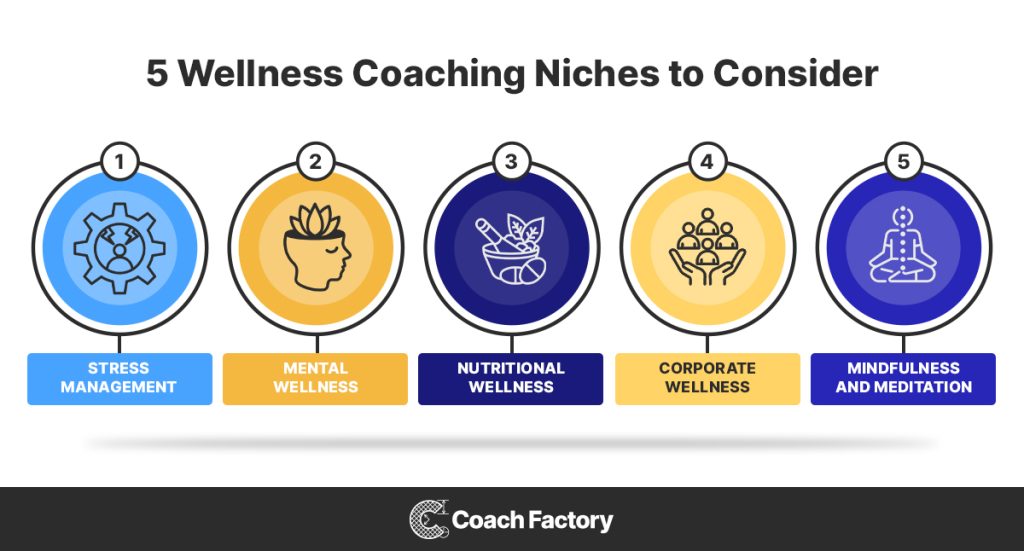In recent years, there’s been an uptick in demand for holistic, person-centered wellness coaches to combat the busy new normals. Specializing in wellness coaching opens new opportunities, allowing you to help clients improve their overall well-being. As a life coach, harnessing the rising wave of wellness could mark the turning point in your coaching career.
In this post, we’ll explore wellness coaching, including available certifications, training courses, and top niches within the industry. Whether you’re new to the coaching arena or a seasoned professional seeking to niche down, you’ll have the knowledge and resources to navigate your wellness coaching journey.
What Is Wellness Coaching?
Wellness coaching places a strong emphasis on all-around health and well-being of the client. This coaching discipline moves beyond the boundaries of health coaching, which is often primarily focused on physical health and nutrition. Instead, wellness coaching adopts a holistic approach, integrating various aspects of life, including mental, emotional, physical, and sometimes even spiritual, to deliver a broad approach to improved well-being.
What Does a Wellness Coach Do?
A wellness coach’s role is to provide advice or prescribe plans and empower clients to make self-directed, long-lasting changes that resonate with their values and life goals. This empowerment process is a vital component of wellness coaching because it acknowledges that each individual is the expert in their life and holds the key to their transformation.
Wellness coaching also requires an equal partnership between the coach and the client. To facilitate this process, the coach offers steady support, motivation, and a variety of tools aimed at helping clients navigate challenges, setbacks, and victories on their wellness journey.
One of the fundamental roles of a wellness coach is to encourage positive change by nurturing a growth mindset in their clients. By harnessing this mindset, clients are encouraged to see challenges as opportunities for growth, enhancing their resilience and adaptability.
Another significant part of a wellness coach’s role includes encouraging clients to take ownership of their wellness journey. By enabling clients to be accountable for their wellness, they become more committed to their goals, driving meaningful and lasting transformation.

What Skills Do You Need to Become a Wellness Coach?
One of the most important skills to have as a wellness coach is the capacity to listen actively and understand the client’s needs fully. Empathy, connecting emotionally, and appreciating the client’s perspective builds trust.
Goal setting and strategic planning skills are also vital for helping clients set realistic, achievable wellness goals and devise strategies to reach them. A coach should also possess a fundamental understanding of holistic health and wellness principles and practices.
Lastly, emotional intelligence — the ability to identify, understand, and manage emotions — is crucial in wellness coaching. It enables coaches to appropriately understand and respond to their client’s emotional needs. Coaches with high emotional intelligence can help clients navigate emotional obstacles that may hinder their wellness journey.
Do You Need a Certification or Degree to Become a Wellness Coach?
No, a degree or certification is not a prerequisite to becoming a wellness coach. Still, you should consider obtaining one or both to elevate your professional status, establish credibility, and offer a competitive edge in the market. Certification also ensures you’ll possess the necessary skills and knowledge to provide effective, evidence-based coaching.
Becoming a certified wellness coach involves completing an approved training program and passing an exam. The training program often includes coursework on health and wellness, coaching techniques, and professional practice. The certification exam tests these areas to ensure competency. Once certified, coaches often need to complete continuing education units to maintain their certification.
Top Certifications, Training, and Courses for Becoming a Wellness Coach
Earning a certification from a reputable organization is essential to establish credibility and ensure that you provide the most effective wellness coaching services.
Here are three top certification and training programs.
1. National Board for Health & Wellness Coaching

As one of the most respected organizations in the field, the National Board for Health & Wellness Coaching offers a certification program that’s recognized globally. Their training equips you with the skills and knowledge necessary for impactful wellness coaching. The certification process involves completing an approved training program and passing a stringent examination to ensure you are ready to provide high-quality coaching.
2. Duke Integrative Medicine’s Health & Wellness Coach Professional Training

The Duke Integrative Medicine’s Health & Wellness Coach Professional Training program stands out for its strong emphasis on integrative health approaches and mindfulness. The training is a blend of online learning and in-person immersive experiences. With Duke’s name backing your certification, you gain significant credibility in the wellness coaching field.
3. American Council on Exercise

American Council on Exercise is known for its health coach certification that blends fitness, nutrition, and wellness elements. While this certification leans more toward physical health, it also equips coaches with the necessary skills to integrate wellness into their practice. ACE’s accreditation is NCCA-accredited, a gold standard in the industry.
Do You Need Insurance as a Wellness Coach?
Technically, no. As a wellness coach, having business insurance is not required. However, all professionals use insurance to protect themselves and their businesses. For example, doctors carry malpractice insurance in the case that they make a tragic mistake or are accused of such behavior. Arborists have general liability insurance to cover the cost of damages caused by a tree falling the wrong direction.
Although wellness coaches are not legally responsible for how clients respond to their coaching in the way that a psychologist or physical therapist is, they can still be taken to court just like any person can.
Can you imagine a disgruntled client suing you? If yes, then maybe a general and professional liability insurance policy would give you peace of mind from that risk. Ask your home or auto insurance agent what options are available for your coaching business.
In addition to insurance, the way you structure your business can also protect you financially in the event that you are sued. For example, running your coaching business as a limited liability company (LLC) puts a buffer between your personal resources and your professional ones. Talk to a lawyer and also see our guide to coaching business plans.

5 Wellness Coaching Niches to Consider
Within the broader field of wellness coaching, there are many sub-niches that coaches can choose to specialize in and distinguish themselves from their competition.
Among the five examples listed below, you may note crossover. After all, what exactly is the difference between a health coach and a wellness coach? Or a fitness coach and a wellness coach? They all operate in a similar sphere. Some may consider each of these sub niches simply another name for wellness coach.
Often the differences in terminology come down to coach preference. Of course, how you label yourself definitely helps potential clients understand what you do. But even more important is how you define your services and how you portray the results that you get for clients. Whatever words you choose to define your flavor of wellness coaching, make sure it reflects the transformations you help clients achieve.

1. Stress Management
A wellness coach who specializes in stress management helps clients understand and manage their stressors effectively. They equip clients with techniques such as cognitive restructuring, relaxation exercises, time management skills, and more.
These coaches often work with busy professionals, individuals going through life transitions, or anyone seeking to manage their stress better.
2. Mental Wellness
Mental wellness coaches help clients maintain and improve their mental health by fostering positive lifestyle changes and promoting self-care practices. They work with individuals facing anxiety or depression or those seeking to enhance their overall mental wellness.
While they do not replace therapists, mental wellness coaches offer complementary support, encouraging clients to develop coping strategies, build resilience, and enhance their overall quality of life.
3. Nutritional Wellness
The nutritional wellness niche focuses on helping clients improve their health through better nutrition. Nutritional wellness coaches provide diet advice, help clients set and achieve their dietary goals, and educate them on the impact of food on their overall health. They understand that eating well is about more than physical health — it’s about enhancing one’s total well-being.
4. Corporate Wellness
Corporate wellness coaches work with companies to develop and implement wellness programs that enhance employee health, reduce stress, and boost morale. They offer one-on-one coaching or group workshops on stress management, nutrition, and work-life balance.
5. Mindfulness and Meditation
Mindfulness and meditation coaches guide clients toward greater self-awareness and inner peace. They teach mindfulness techniques and meditation practices to help clients to live in the moment, reduce stress, and improve their mental clarity.

Is a Wellness Coach the Same as a Personal Trainer?
Wellness coaches and personal trainers have quite a bit of overlap in function and objectives, but they are not exactly the same. Both operate in unregulated industries where certification and training are helpful but not legally required. Both help clients feel better and grow in health.
But a wellness coach typically takes a broader view than a personal trainer, looking at the entire scope of a person’s wellbeing, including physical, emotional, and even spiritual aspects. A personal trainer, on the other hand, is centered almost exclusively on bodily fitness and helps clients to master certain exercises or athletic skills or coaches clients to achieve specific fitness goals like deadlifting a certain amount of weight or achieving a particular time in a running race.
Are Wellness Coaches in Demand?
Because personal wellness is so integral to a happy and productive life, wellness coaches of all kinds are in high demand. In fact, due to the overburdened and inefficient medical system in the United States and a worsening physician shortage, wellness needs are increasingly being addressed by wellness coaches instead of by professionally trained doctors.
Clients love the flexibility, customization, and personalization that wellness coaching provides — something that many medical practices can’t, or won’t, offer. Wellness coaching appeals to people who have felt dismissed by medical professionals, stymied by restrictive insurance companies, or postponed by backlogged appointment calendars.
Is Wellness Coaching the Right Niche for You?
Before becoming a wellness coach, you may want to step back and first confirm that it’s a suitable niche for you. Does it align with your passions and your skills? Use the free coaching niche worksheet to analyze your best coaching fit. As a VIP member, besides this worksheet, you’ll also find exclusive interviews about finding and confirming a niche in the resource library.
Wellness Coaching Is an Impactful Coaching Career
Becoming a wellness coach is a rewarding career that allows you to impact the well-being of your clients. This diverse field provides various opportunities to specialize in that align more closely with your passions and expertise. Whether stress management, mental wellness, nutritional wellness, corporate wellness, or mindfulness and meditation, you can create a thriving practice in your chosen niche.
By becoming a wellness coach, you position yourself at the forefront of the coaching industry while positively impacting the lives of your clients and society as a whole.


